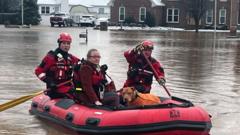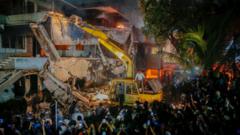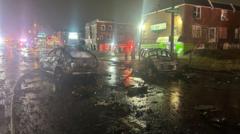In a turbulent parliamentary session, Valencia's leader Carlos Mazón faced backlash over his response to the 29 October floods that claimed over 220 lives, admitting mistakes while resisting calls to resign and attributing delays to government agencies.
Valencia Leader Acknowledges Mishandling of Deadly Flood Crisis Amid Resignation Calls

Valencia Leader Acknowledges Mishandling of Deadly Flood Crisis Amid Resignation Calls
Carlos Mazón admits failures during the catastrophic floods in Valencia, facing protest demands for his resignation.
Valencia's conservative leader, Carlos Mazón, found himself at the center of a storm following catastrophic floods that struck the eastern coastal region on 29 October, resulting in more than 220 fatalities. Addressing the regional parliament for the first time since the disaster, Mazón conceded that mistakes were made in the emergency response but insisted it was due to failures from two government agencies responsible for alerts. Protesters clamored for his resignation outside the parliament, condemning his decision to prioritize lunch with a journalist over swift action during the crisis.
The floods overwhelmed the Valencia area without prior adequate warning, as alerts were only dispatched after the disaster had gained momentum. Many criticized the timing, highlighting that it was too late by the time residents were informed. During the parliamentary session, Mazón defended his actions, claiming the text alert system had never been used prior and stating, "We did the best we could in the situation we were in."
Appearing under police scrutiny due to a rising tide of dissent, crowds outside shouted inflammatory slogans such as, “El President a Picassent,” as others displayed placards accusing leaders of complicity in the disaster. Mazón pointed fingers at Spain's Aemet weather agency and the independent Júcar authority for not giving sufficient warnings, despite their early issuing of a red alert for high rainfall.
Witnesses like a local resident characterized the mismanagement during the catastrophic event as "abhorrent," underscoring a sentiment among the public that lives could have been saved with a more effective governmental response. Now, amidst the remnants of destruction, citizens in towns like Paiporta are faced with a grim recovery process, inundated with sludge and left reliant on volunteers for sustenance.
Mazón ultimately offered an apology to those who felt neglected in the wake of the flood and attempted to explain his absence at the Emergency Coordination Center earlier on 29 October. However, the community remains skeptical, especially as local leaders admit to a lack of knowledge regarding available emergency warning systems. Amid such frustration, residents like José Sánchez Maigallon noted that only the tireless work of volunteers provided any semblance of support following the disaster.
"We're here trying to restore a sense of normalcy," he reflected, acknowledging shared accountability among various government levels while maintaining hope for a better tomorrow. As cleanup efforts continue, Valencia's political and social landscapes transform under the weight of collective grief and resilience.




















